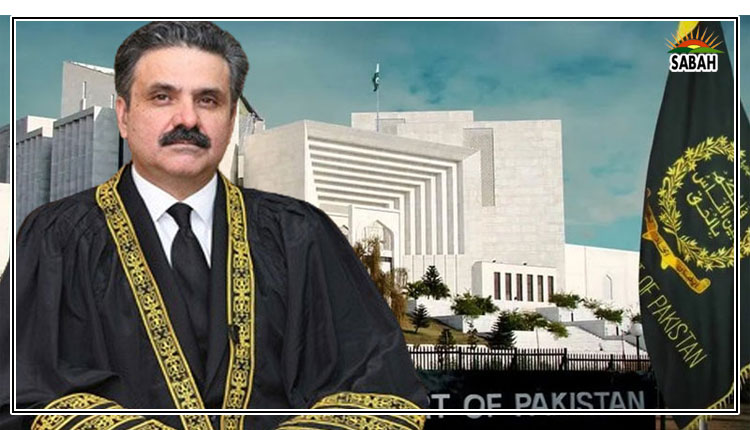The fault is not in our stars… Aasiya Riaz
Even though the ECP verdict on the prohibited funding case against the PTI in August 2022 took a long time coming, Pakistan has rarely seen sharper focus on the legal system governing use of money in politics and the procedures in place to gauge its effective implementation.
Regardless of the impact on political fortunes of the PTI, it managed to highlight the importance of the law governing raising and using money for political purposes, just as it was hoped that it drove home the importance of rigorously following the letter of the law for political classes.
But five months later, this has proved to be just another case of exaggerated optimism. As the calendar year ended, every elected representative of the people in the national and provincial assemblies and the Senate was legally required to submit to the ECP a copy of their statement of assets and liabilities. But information released from the ECP shows that not much has changed this year as 570 or 48 per cent legislators belonging to parliament and the provincial assemblies did not bother to keep the annual legal deadline to submit their statements of assets and liabilities to the ECP.
The legal requirement for elected MPs to submit their annual statements of assets and liabilities is not new. This has been part of the legal regime governing the use of money in politics over two decades. Therefore astonishing as it may sound, in the past 20 years or so, most if not all elected legislators have missed the annual deadline until the ECP, by law, temporarily suspends their membership of the assemblies, publicises this information and only restores their membership after they submit the required statements.
The numbers do tell an embarrassing tale. According to the data released by the ECP, of the 1191 total legislators combined in our Senate, national and provincial assemblies, it has only received statements of assets and liabilities from 610 MPs by the deadline of December 31. Since 11 seats are currently vacant across all legislatures, 570 MPs across Pakistan have missed the legal deadline of submission. These include 36 Senators, 201 or nearly 59 per cent MNAs, 159 or nearly 43 per cent Punjab MPAs, 76 or 45 per cent Sindh MPAs, 74 or 51 per cent Khyber Pakhtunkhwa MPAs and 24 or nearly 37 per cent Balochistan MPAs.
The breach of the legal deadline is not just limited to backbenchers in a legislature. Just in the federal cabinet alone, 17 federal ministers, which constitutes half 50 per cent of the federal ministers at this time, have also bypassed the legal deadline of submission of their assets and liabilities to the ECP. At least two of the seven ministers of state have also failed to comply with the legal deadline.
The Elections Act, 2017 which was passed by parliament with political consensus that seems utterly rare in polarized political atmosphere of today, carries this legal requirement in detail. Clause 137 of the law states the annual requirement for each legislator to submit to the ECP, on or before December 31 each year, a copy of their statement of assets and liabilities including assets and liabilities of their respective spouses and dependent children.
The clause then describes in further detail that the ECP, on the first day of January each year through a press release, shall publish the names of members who failed to submit the requisite statement of assets and liabilities within the period specified. Then, on the sixteenth day of January, the ECP by an order suspends the membership of a member of an assembly and Senate who fails to submit the statement of assets and liabilities by the fifteenth day of January and such member ceases to function till the filing of their required annual statement of assets and liabilities.
The Elections Act, 2017 further elaborates the seriousness of the requirement for legislators to submit correct annual statements of assets and liabilities. The law states that if a legislator submits such a statement of assets and liabilities which is found to be false in material particulars, the member may, within 125 days from the date of submission of the statement, be proceeded against for committing the offence of corrupt practice.
The annual submission of statements of assets and liabilities is part of the disclosure obligations for candidates and elected representatives and falls under Pakistans legal regime governing political finance, a term which is used to describe all money and funds that are raised and spent for political purposes such as for electoral campaigns, party and candidate funding and how this funding is regulated and disclosed in a political system. Our electoral laws also include spending limits and submission of key financial data from candidates, legislators and parties.
Even though some of these legal requirements are criticized to be solely applicable to politicians, it is important to remember that it is the robustness of laws governing the role of money in politics and their effective implementation that determine integrity, transparency, and accountability of a representative democracy.
Pakistan is not unique in its legal structure of political finance as similar or better systems exist across all democracies. In fact, Pakistan needs to strengthen the laws regulating money and their fair and effective implementation if we are to achieve the goal of facilitating citizens of average financial means to be able to successfully participate in electoral and representative politics.
Without effective regulation, use of money in politics opens democracy to the dangers of policy capture. Our political finance system requires a limit on election spending by parties and a transparent system of regulating public, private, and corporate funding to parties and candidates in addition to the crucial need of building adequate capacity of financial monitoring, scrutiny and enforcement in the ECP.
So what is it supposed to mean to citizens if nearly half of our elected representatives have failed to adhere to the annual deadline of the legal disclosure obligation? Does it show their lack of disregard for the law? Or because missing a couple of legal deadlines amounts to a mere rap on the knuckles in the form of temporary suspension of membership and therefore no lasting political harm? In any case, one thing is clear that this repeated negligence by legislators shows that their naming and shaming built into the law has not resulted in better legal compliance by the very lawmakers who have passed this into the law.
Just in this context then, is it hard to understand the consistent poor ranking of Pakistan in adherence to rule of law in the global Rule of Law Index year after year? If our lawmakers regularly display such disregard for the letter of the law, what hope is there for the countrys democratic governance which is so centrally tied to the rule of law?
The writer is an analyst working in the field of politics, democratic governance, legislative development and rule of law.
Courtesy The News












